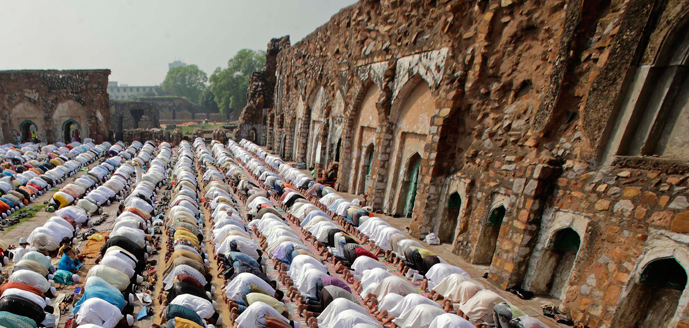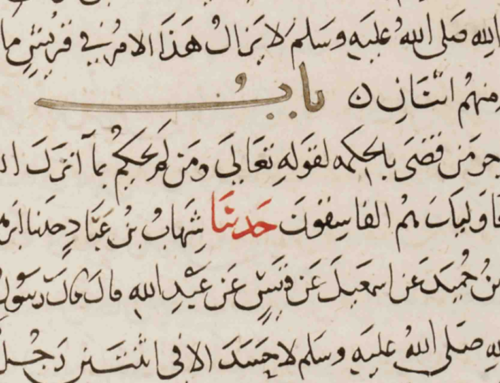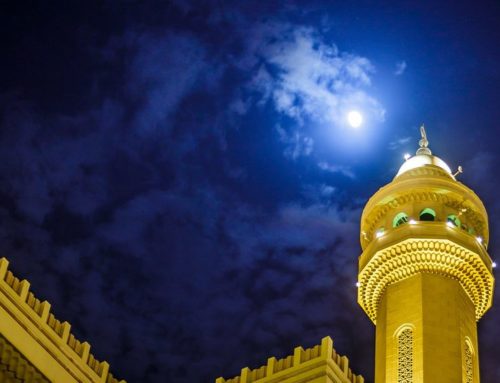A Translation by Humzah Wald Maqbul from the Bidayat al-Mujtahid of Ibn Rushd al-Hafid al-Qurtubi, An Authoritative Manual on the Fiqh of the Four Madhhabs and the People of the Sunnah.
[The people of knowledge] have differed about [what to do] when the ʿid and the Friday fall on the same day: would the ʿid [prayer] suffice [one who prayed it] in place of the Friday prayer? A group [of the people of knowledge] said: “The ʿid [prayer] suffices [one who prayed it] in place of the Friday [prayer], and such a person is not obligated to pray [after the ʿid prayer, anything] except ʿAsr.” This is the opinion of ʿAta’, and it has been attributed to Ibn Zubayr and ʿAli [may Allah be well pleased with them].
[Another] group said, “This is a dispensation meant for Bedouin nomads who come especially to a metropolis only for ʿid and the Friday prayer.” This is in accord with what has been attributed to Sayyiduna ʿUthman, [may Allah be well pleased with him,] that he gave the khutbah of ʿid on a Friday, then said, “Whoever of the people of ʿAliyah [1]ʿAliyah here is a reference to ʿAwali, an area outside of the city of Madinah which extends from the border of the city, to about three miles out. The people of ʿAwali were expected to come to the … Continue reading wishes to await the Friday prayer, let him wait; whoever wishes to return, let him return.”
[This] was narrated by Malik in the Muwatta’, and similar has been attributed to ʿUmar ibn ʿAbd al-ʿAziz, and Shafiʿi has chosen it [as his fatwa, may Allah have mercy upon them all] [2]Note that Shafiʿi’s opinion is that missing the Friday prayer after having prayed ʿid is a dispensation for Bedouins like the people of ʿAwali only, and not those who actually live in the city.
Malik and Abu Hanifah said, when ʿid and Friday coincide, a legally responsible person is expected to perform both: ʿid because it is a sunnah [3]It is a sunnah mu’akkadah according to the most correct fatwa of Malik (Khalil, al-Mukhtasar), and wajib according to Abu Hanifah (Quduri, al-Mukhtasar ), and the Friday prayer, because it is obligatory. [They maintain that] neither one takes the place of the other; this is the default assumption that is to be taken, unless there is some [explicit] legislation to the contrary which [is so strong that one] is obliged to change [one’s opinion] to it. [4]Note that the Hanafis, Malikis and Shafiʿis are unanimous that residents of the city are obliged to pray both the ʿid and Friday prayers. This is the preponderant majority opinion of the People of … Continue reading
Those who take the opinion of [Sayyiduna] ʿUthman [do so] because it is a matter that one cannot deduce by mere opinion; rather [according to them], it can be nothing other than [a fatwa] in accordance [to the Sunnah]. [Also] it is not totally outside the bounds of the default state [of the Shariʿah, as it still has most people obliged to pray the Friday prayer].
As for dropping the obligatory Zuhr and Friday prayers, which would be dropped in the place of the ʿid prayer, this would be very much against the default state [of the rulings of the Shariʿah and has no weight] unless there is some explicit legislation to the contrary, which [is so strong that one] is obliged to follow it. [5]Please see footnote no.8 [The scholars of this opinion further] differed about one who missed the ʿid prayer with the Imam. A group said that he should pray four [rakaʿat]. This is the opinion of [Imams] Ahmad and [Sufyan] al-Thawri. It is also attributed to [ʿAbdullah] ibn Masʿud, [may Allah be pleased with them all].
A group of them said that [such a person] should make up [the ʿid prayer], praying it like the ʿid prayer is prayed: two rakaʿat in which one makes the takbirs just as one would do so in the ʿid prayer, and one recites out loud just as one would do so in it. This is the opinion of Shafiʿi, [may Allah have mercy on him], and Abu Thawr.
[Another] group of them said that he should just pray two [normal] rakaʿat, in which he neither recites out loud, nor makes any of the [extra] takbirs of the ʿid prayer.
[Yet another] group of them said that if the Imam has prayed in the same place [that the one who missed the prayer is praying], then he should pray two rakaʿat; if he is praying in a place other than the musallah [of the Imam], then he makes up four rakaʿat.
[And yet another] group of them said that he is basically neither obliged to [nor is he able to] make up [the ʿid] prayer. This is the fatwa of Malik and his companions. [The great third century mujtahid] Ibn al-Mundhir [also] relates [from Malik] an opinion similar to that of Shafiʿi [may Allah have mercy on them all].
As for those who said that [he must make up] four [rakaʿat], he has made it [i.e. the ʿid prayer] the equivalent to the Friday prayer. This is a weak comparison.
Those who said that [he must make up] two rakaʿat in the way that the Imam prayed them go towards the position that the default state is that a make-up prayer should be performed in the manner of the prayer missed.
Those who said that [the ʿid prayer] cannot be made up, [say so] because it is a prayer [whose validity] is conditioned on [the presence of] the congregation and the Imam, similar to the Friday prayer. For this reason one is not obliged to make it up through two or four rakaʿat, as [even if he prayed them] they wouldn’t mean anything [as a true replacement to the ʿid prayer]. These two rulings are the ones in which there is a [valid] difference of opinion, by which I mean the opinions of Malik [6]Abu Hanifah and Malik both have the same opinion. and Shafiʿi.
As for the rest of the rulings [mentioned] on this issue, they are weak, and meaningless, because the Friday prayer replaces, [however is different from] Zuhr, and these [i.e. the set of four rakaʿat] don’t seem to stand in the place of anything, [in that they are prayed before the time that Zuhr comes in, so they cannot validly be considered Zuhr, and since they are four, they don’t even resemble ʿid or the Friday prayer. This being so,] how can one construct the analogy of one to the other for the purposes of making the prayer up?
In reality even one who misses the Friday prayer and then prays Zuhr, isn’t making up the Friday prayer, as one cannot stand [equally] in the place of the other. Rather he is [only] praying [his normal] Zuhr as an [inferior] replacement for it, [i.e. the Friday prayer] which he missed, and which was obligatory upon him. [7]Note that by this tract further Ibn Rushd emphatically restates his opinion that the ʿid prayer logically cannot replace the Friday prayer.
And Allah is the One who gives the ability to find that which is correct. [8]Ibn Rushd was considered to be a master of the rational sciences. It is for this reason that he digests the fiqh of the four madhhabs and the People of the Sunnah from a mostly rationalist … Continue reading
Download (pdf): Is the Friday Prayer Obligatory After the Eid Prayer?
| ↑1 | ʿAliyah here is a reference to ʿAwali, an area outside of the city of Madinah which extends from the border of the city, to about three miles out. The people of ʿAwali were expected to come to the city for the Friday prayer, except that Sayyiduna ʿUthman exempted them from having to do so, if they prayed ʿid on a Friday in Madinah (al-Baji, al-Muntaqa). |
|---|---|
| ↑2 | Note that Shafiʿi’s opinion is that missing the Friday prayer after having prayed ʿid is a dispensation for Bedouins like the people of ʿAwali only, and not those who actually live in the city. |
| ↑3 | It is a sunnah mu’akkadah according to the most correct fatwa of Malik (Khalil, al-Mukhtasar), and wajib according to Abu Hanifah (Quduri, al-Mukhtasar |
| ↑4 | Note that the Hanafis, Malikis and Shafiʿis are unanimous that residents of the city are obliged to pray both the ʿid and Friday prayers. This is the preponderant majority opinion of the People of the Sunnah. |
| ↑5 | Please see footnote no.8 |
| ↑6 | Abu Hanifah and Malik both have the same opinion. |
| ↑7 | Note that by this tract further Ibn Rushd emphatically restates his opinion that the ʿid prayer logically cannot replace the Friday prayer. |
| ↑8 | Ibn Rushd was considered to be a master of the rational sciences. It is for this reason that he digests the fiqh of the four madhhabs and the People of the Sunnah from a mostly rationalist perspective. It is from this perspective that he dismisses as baseless the opinion that the ʿid prayer can obviate the obligation of, or substitute for the Friday prayer.
As for one who would say that there are hadiths that indicate that the messenger of Allah, may the peace and blessings of Allah be upon him, allowed the people to (a) skip the Friday prayer, after having prayed the ʿid prayer, or that his blessed hadiths indicate that (b) the Friday prayer can be validly prayed in the time between after sunrise and noon, thus making the ʿid prayer, which consists of two rakaʿat and a khutbah, effectively into a valid Friday prayer; the response is as follows. The obligation of praying the Friday prayer, as well as the valid discharge of the obligation of praying the Friday prayer in the time of Zuhr is established by tawatur, meaning that it comes through so many narrations and other channels that there is no denying or questioning their validity. One who does so is deemed to be outside of the pale of Islam. This is a point on which all of the People of the Sunnah agree. If one wishes to modify either these two points they must either bring some kind of rational proof, which would be admissible as long as no hadith is explicitly contrary to it; or they must bring a hadith or narration that is at least as strong as those hadiths or narrations about the default rulings regarding the Friday prayer and its timings that they break (a) or modify (b). Ibn Rushd is methodical in showing that a rational proof is not forthcoming. He also maintains, as do the Hanafis, Malikis, Shafiʿis that there is no hadith which is strong enough to prove the validity of breaking or changing the default rulings regarding the Friday prayers and its timings. This is what he means when he says “… unless there is some explicit legislation to the contrary, which [is so strong that one] is obliged to follow it.” The Hanbalis don’t claim any rational backing for (a) or (b), rather they bring some hadiths and narrations which they feel fulfill the conditions necessary to either break or modify the default rulings about the Friday prayer and its timings. It is for this reason that the People of the Sunnah hold that the views of the Hanbalis regarding this issue are a valid difference of opinion, despite the majority of Sunni scholarship not accepting them as correct. My reason for preparing this tract was not to categorically claim that the Hanbali opinion is totally baseless; rather I notice that the average Muslim in my area seems to be under the false impression that the Hanbali opinion is the only one, and that all others are incorrect. This is not only untrue, but it also ignores the fact that the obligation of praying both the ʿid and Friday prayers is established by the rulings of the overwhelming majority of the scholars of Islam throughout the ages. For further reading on the Hanbali basis for the validity of not praying the Friday prayer after praying the ʿid prayer, please see al-Mughni of Ibn Qudamah al-Maqdisi. |






